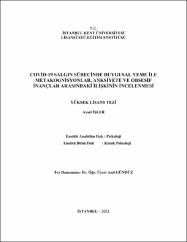Covıd-19 salgın sürecinde duygusal yeme ile metakognisyonlar, anksiyete ve obsesif inançlar arasında ilişkinin incelenmesi
Citation
İşler, A. (2021). Covıd-19 salgın sürecinde duygusal yeme ile metakognisyonlar, anksiyete ve obsesif inançlar arasında ilişkinin incelenmesi. Yayımlanmış yüksek lisans tezi. İstanbul Kent Üniversitesi, İstanbul.Abstract
Bu çalışmanın temel amacı, Covid-19 salgını sürecinde değişen yaşam
düzeninden etkilendiği düşünülen bireylerin duygusal yeme davranışları ile
metakognisyonları, obsesif inançları, depresyon ve anksiyete düzeyleri arasındaki
ilişkiyi incelemektir. Çalışmanın örneklemi, Türkiye’nin farklı şehirlerinde yaşayan
18-65 yaş arası 513 kadın ve 118 erkek olmak üzere toplam 631 kişiden oluşmaktadır.
Çalışmada yer alan sosyodemografik veri formu, Duygusal İştah Anketi, Covid-19 ile
Takıntı Ölçeği, Koronavirüs Anksiyete Ölçeği, Bilişsel Dikkat Kilitlenmesi
Sendromu-1 Ölçeği, Beck Depresyon Envanteri, Beck Anksiyete Ölçeği, online olarak
cevaplanmış, SPSS 26 paket programı ile analiz edilmiştir. Değişkenler arasındaki
ilişkileri incelemek için korelasyon analizi ve ki-kare testi, grup ortalamalarının
istatistiksel farklılığını test etmek için Mann Whitney U ve Kruskal-Wallis H Testleri,
farklılık kaynağının tespiti için Tukey HSD Testi, değişkenlerin duygusal iştahın
açıklanmasına katkısını belirlemek için çoklu lineer regresyon analizi uygulanmıştır.
Çalışmanın sonucunda, Covid-19 virüsüne yönelik anksiyete düzeyi ile kişilerin
duygusal durumlarda yeme davranışları arasında pozitif yönde anlamlı bir ilişki
bulunmuştur. Ayrıca, olumlu ve olumsuz duygu ve durumlarda yeme davranışları ile
BDKS arasında pozitif yönde anlamlı ilişki bulunurken, metakognitif inançlar ile
sadece olumlu duygu ve durumlarda yeme davranışı arasında pozitif yönde anlamlı bir
ilişki bulunmuştur. Diğer yandan, olumlu ve olumsuz duygu ve durumlarda yeme
davranışları ile kişilerin depresyon ve anksiyete düzeyleri ve Covid-19’a yönelik
obsesif inançlar arasında anlamlı bir ilişki bulunamamıştır. The main purpose of this study is to examine the relationship between emotional
eating behaviors and metacognitions, obsessive beliefs, depression, and anxiety
levels of individuals who are thought to be affected by the changing lifestyle during
the Covid-19 epidemic. The sample of the study consists of a total of 631 people,
513 women and 118 men, between the ages of 18-65 living in different cities of
Turkey. The sociodemographic data form, Emotional Appetite Questionnaire,
Obsession with Covid-19 Scale, Coronavirus Anxiety Scale, Cognitive Attentional
Syndrome-1, Beck Depression Inventory, Beck Anxiety Inventory included in the
study were answered online and analyzed with SPSS 26 package program. In this
study, correlation analysis and chi-square test were used to examine the relationships
between the variables. Mann Whitney U and Kruskal-Wallis H Tests were used to
test the statistical difference of the group means, and Tukey HSD Test was applied
to determine the source of the difference. Multiple linear regression analysis was
used to determine the contribution of the variables to the explanation of emotional
appetite.
As a result of the study, a positive and significant relationship was found
between the level of anxiety towards the Covid-19 virus and the eating behaviors of
people in emotional situations. In addition, there was a positive and significant
relationship between eating behaviors in positive and negative emotions and
situations and BDKS, while a positive significant relationship was found between
metacognitive beliefs and eating behavior only in positive emotions and situations.
On the other hand, no significant relationship was found between eating behaviors in
positive and negative emotions and situations, depression and anxiety levels of
individuals, and obsessive beliefs about Covid-19.


















